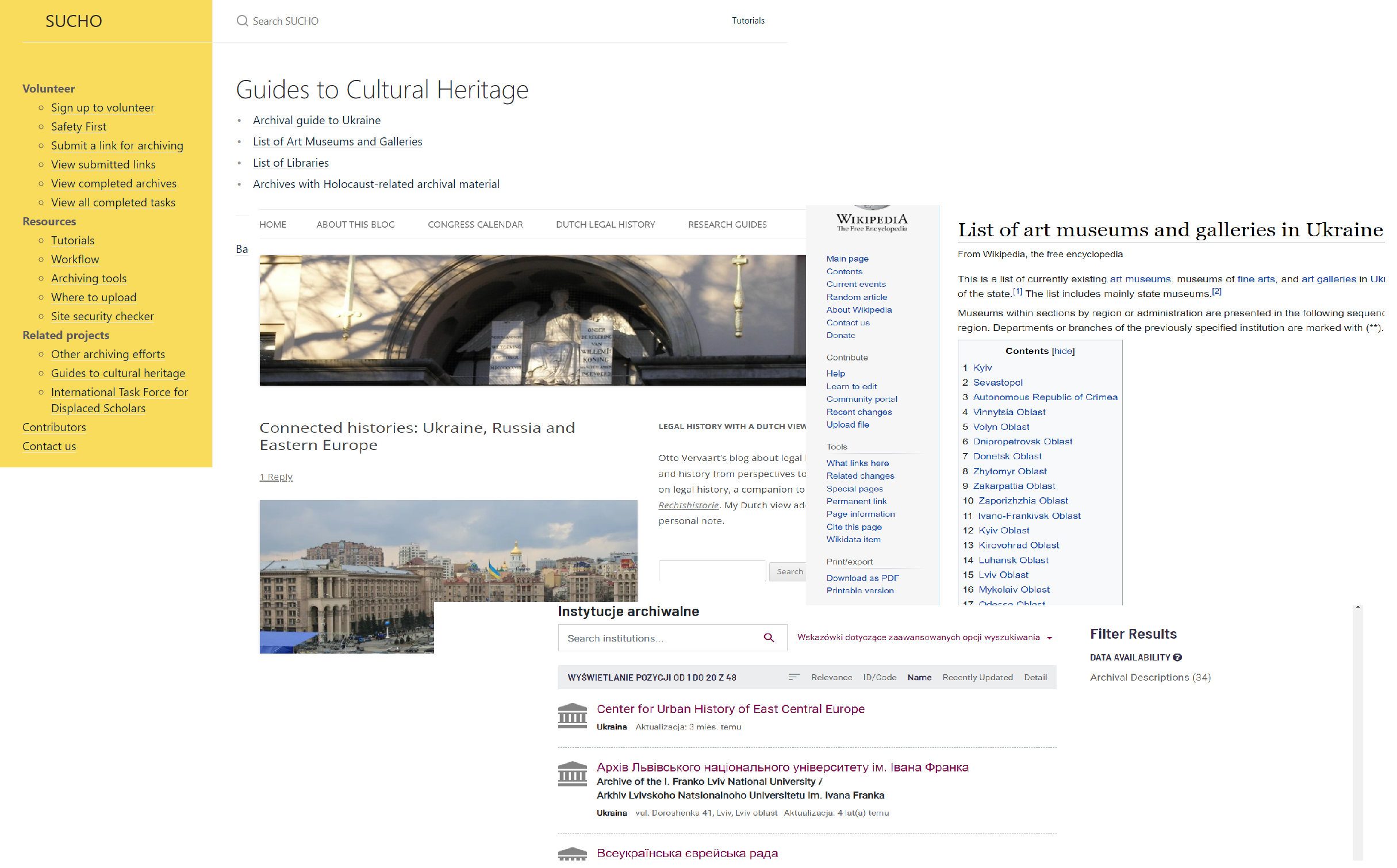Article / interview
Saving Ukrainian Cultural Heritage Online (SUCHO)
We are a group of cultural heritage professionals – librarians, archivists, researchers, programmers – working together to identify and archive at-risk sites, digital content, and data in Ukrainian cultural heritage institutions while the country is under attack. We are using a combination of technologies to crawl and archive sites and content, including the Internet Archive’s Wayback Machine, the Browsertrix crawler and the ArchiveWeb.page browser extension and app of the Webrecorder project.

How you can get involved
- No clue what’s going on? Visit our orientation page.
- Submit important URLs for collections in cultural heritage institutions in Ukraine
- If you can read Ukrainian or Russian, or if you can run the Browsertrix crawler (check out our Browsertrix documentation to see if it’s something you’d be up for trying), fill out the volunteer form.
- We are currently at capacity for people to help with Wayback Machine / Internet Archive tasks or manual Webrecorder tasks, but you can still help by submitting URLs.
Project admins:
- Quinn Dombrowski, Stanford University
- Anna E. Kijas, Tufts University
- Sebastian Majstorovic, Austrian Centre for Digital Humanities and Cultural Heritage
You can reach all the admins at info@sucho.org. If you are a Ukrainian scholar who needs free storage for your research materials, please email storage@sucho.org to be connected with our partners at the Harvard Ukrainian Research Institute and the University of Alberta.
Information
See also
Israeli Universities' Emergency Fellowships for Ukrainians
Below is a list of Israeli Universities/institutions of higher learning that offer emergency fellowships for scholars/students from Ukraine. The list will get updated as more universities and departments join in every day. There are also several individual scholars or labs that are willing to offer fellowships. I will update the list when I get more info from them. You can also contact me directly and i will do my best to help you navigate the system: innale@openu.ac.il.
Bar-Ilan University stands with students, lecturers, researchers, and academic staff from Ukraine with special assistance
Bar-Ilan University identifies with the challenging situation that the Ukrainian people are facing, and has therefore established a special fund to assist guest researchers, lecturers, undergraduate and graduate students who come to Bar-Ilan University. We invite Ukrainian students to come study in any of our English language degree programs and to integrate into our existing research groups. Ukrainian and Russian speaking students can be mentored in their native language by Bar-Ilan students, thus ensuring a smoother absorption into campus life. Additionally, the university’s clinic networks are available to provide any necessary emotional, social or legal assistance if so needed.
Words of support and solidarity with the Ukrainian people
Today we have no words. Our thoughts and hearts remain with our friends and associates from Ukraine. Voices of support and solidarity with the Ukrainian nation are coming from everywhere. We are trying to keep you informed about it on Facebook. Below we present what have been sent to our editorial team today: from our parent Institute of Literary Research of the Polish Academy of Sciences, the Polish Writers' Association, the Polish PEN Club and the Council of University of Łódź.
Art in the Places of Death. An interview with Prof. Halina Taborska
"Halina Taborska's book (...) is a peculiar study of the aesthetics of an anti-humanistic act. In fact it introduces such "aesthetics" to the readers, and we are presented with a very carefully prepared documentation of various objects, material and spatial shapes, "installations", murals, museum organizations and documentary activities. These are various shapes in the public space which mediate our perception of an unimaginable crime or "blinding” shapes that protect us from the damages of seeing it again. By bringing this collection of practices together, the book shows their character and multiplicity. The research material gathered in the publication and the scholarly approach make it a must-read not only in the study of war crimes in Europe, but also in the study of symbolic representation of mass crimes - especially in the field of cultural studies, cultural anthropology and art history.” (Prof. Jan Stanisław Wojciechowski, Academy of Fine Arts in Warsaw - excerpt from the review on the cover).